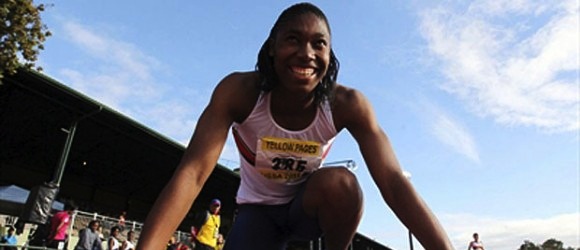IAAF Gender Testing Policy Denounced As Bad Science And Discrimination by Bioethics Panel
she blinded me with science

In 2009, South African athlete Caster Semenya won gold in the women’s 800m at the World Athletics Championships. With barely enough time to bask in her achievement, Semenya was thereafter subjected to a publicly humiliating “gender test” and forced to withdraw from the rest of the competition. Now, a Stanford bioethics panel is contesting this practice, citing it as an unnecessary, poor application of the science of hormones.
Semenya was essentially turned into a spectacle because she is an intersex person, a term that denotes a category of conditions that result in uncommon combinations of physical sex characteristics. In her case, her medal was contested because she does not have ovaries, she has internal testes, and consequently produces a larger amount of testosterone than most women.
In light of her testosterone levels, and the fact that she had won the race, the International Association of Athletics Federations instituted a policy that held that women with unusually high levels of testosterone would be banned from competition unless they lowered their hormone levels via surgery or drugs. This policy was based on the assumption that “androgenic hormones (such as testosterone and dihydrotestosterone) are the primary components of biologic athletic advantage.” The IAAF planned to instate these regulations as early as this year’s London Olympics.
However, a panel of scientists, sports experts, and bioethicists from the Stanford Center for Biomedical Research has recently stepped up to challenge this policy and the entire notion that higher levels of testosterone result in a fundamental physical advantage in sports, releasing a critique of the policy today in the American Journal for Bioethics.
In addition to the gender test being a gross invasion of privacy, it is fundamentally flawed in that there is no simple link between testosterone and athletic advantage. According to Rebecca Jordan-Young, “individuals have dramatically different responses to the same amounts of testosterone, and it is just one element in a complex neuroendrocrine feedback system.” The panel argues that athletic performance is not wholly decided by hormone levels, and that there are a variety of other biological variations that could influence performance that they are not testing for, including a “rare mitochondrial variations that give them extraordinary aerobic capacity” and “acromegaly, a hormonal condition that results in exceptionally large hands and feet.”
These conditions likely aren’t tested for, however, because they aren’t tied up with a rigidly enforced sex and gender binary, where women and men fit into discrete categories with appropriate levels of certain hormones (regardless of the fact that “it’s not known what typical testosterone levels even are for elite female athletes.”) As Monica Roberts on TransGriot points out, “if it coincides with what the ‘experts’ consider as ‘too rapid’ athletic performance for a woman, she may find herself being subjected to a battery of embarrassing and invasive tests just to prove to cynical skeptics that she’s ‘woman enough’ to compete in elite sports with other women.” As such, “gender testing” functions less as an instrument to “level the playing field” for women and more as a tool to police the gender of women athletes, women who are often denigrated for being “too manly.”
The panel recommends that the IAAF end gender testing entirely, citing both the psychological impact that such discrimination has on women athletes who undergo the test, and the fact that it is a policy wholly formulated upon misused science and a threat of cheating that has never proved to be a significant problem.
(via I09.)
Have a tip we should know? [email protected]